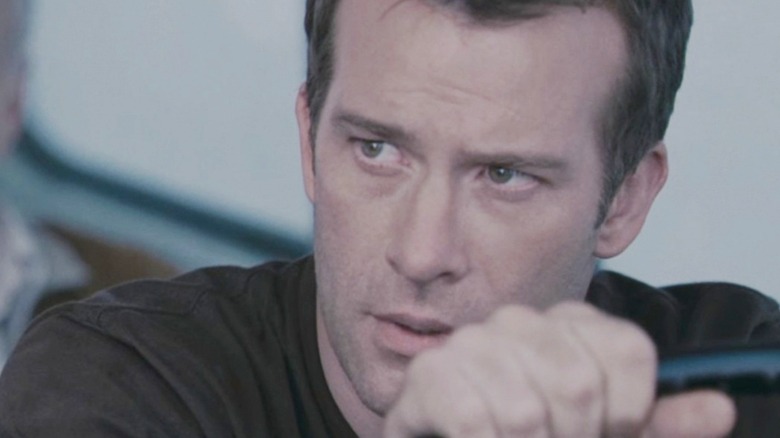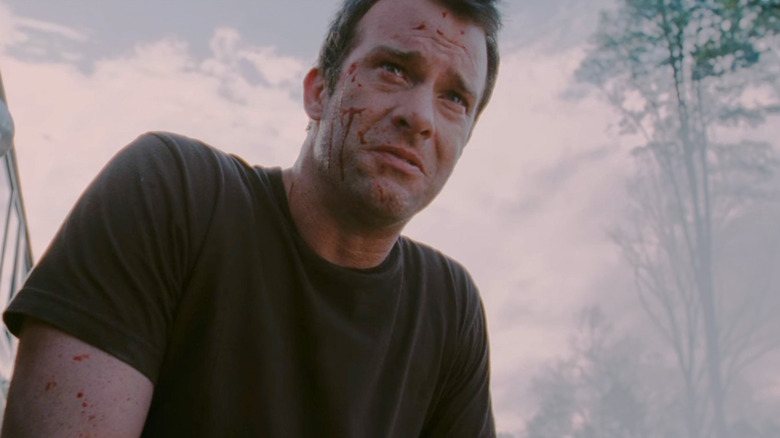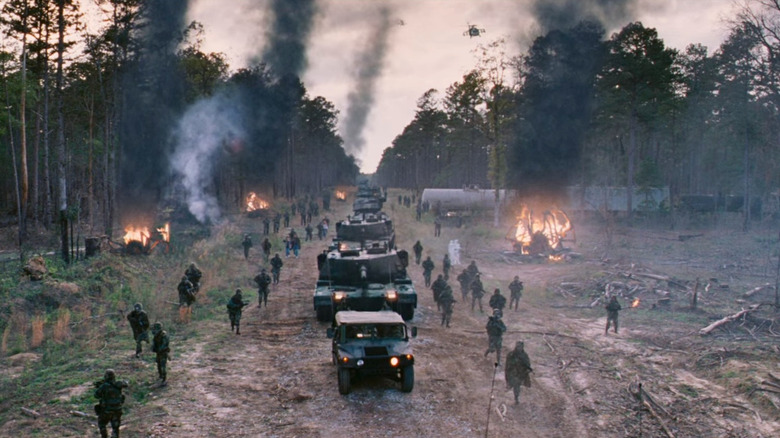Frank Darabont Kept The Mist's Infamous Ending Under Lock And Key [Exclusive]
This article contains spoilers for the ending of "The Mist," both the film and the novella.
Across movie history, filmmakers have gone to great lengths to maintain a surprise. Whether it's filming under fake names to throw off would-be scoopers or Marvel keeping the "Hawkeye" villain secret from everyone on the crew, directors don't want people knowing too much (that is, until the trailer ruins it). Some directors even shoot multiple endings to make sure their cast don't know what's going to make it to the final cut. When it came time to film "The Mist," director Frank Darabont's 2007 adaptation of a Stephen King novella, some similar ingenuity was required to keep its shocker of an ending under wraps.
The gruesome finale sees Thomas Jane's David Drayton lay waste to his band of fellow survivors, including his own son, to spare them a grizzly fate at the hands of the creatures lurking in the mist. But in a dramatic change to King's original, more hopeful ending, Darabont makes a comment on the need to maintain hope (or, depending on how you see it, a comment on how you're doomed to succumb to the horror of existence, whatever you do) by immediately having Drayton be saved by the military. Had he held on and, y'know, not killed his son, he and his embattled group would have survived.
Having subverted the author's original finale, Darabont had given his sci-fi horror a standout moment that would leave audiences reeling for years. But in order for it to really hit home, he needed to keep it a secret, and as he explained in an exclusive new interview on the film's 15th anniversary for the oral history of the making of "The Mist," he had a simple way to keep that secret.
Keeping things simple
Darabont, who still stands by the film's shocker of an ending, didn't need to go to the lengths of shooting multiple versions of the climax to keep "The Mist" on track. In fact, he had a much simpler approach to keeping everyone in the mists of ignorance: not putting the ending in the script. At least, not putting it in the scripts that went to most of the cast and crew.
As Sam Witwer, who plays the ill-fated Wayne Jessup in the film, recalls:
"I was not trusted. I did not have clearance. I remember I didn't even try to find out what the ending was. They were like, "Do you know what the ending is?" I'm like, "I don't." "Do you want to know?" I'm like, "Actually, I don't."
Darabont himself explained that with a vast crew, which the director had poached straight from the set of "The Shield," he didn't want "some jerk" giving the ending away. Thus, he kept the final scene out of the script that was circulated to the cast and crew. Had he not, the director maintains that any one of the team could have "jumped online and give the ending away."
And it seems the director actually did his crew a favor, as the actual shooting of the end scene sounds like a bit of a harrowing experience anyway. As Nathan Gamble, who played Billy Drayton, recalled, they kept him off-set for Jane's final descent into despair as Drayton: "I could hear it through the walls ... and it was pretty sad. I mean, it was really sad to just focus on two plus two is four when there's a man just screaming for his life on the other side of the wall."
There was still some risk involved
These days, with some online communities ravenous for the latest scoop or spoiler, keeping a film's story under wraps is a common practice. But in the case of Darabont's 2007 effort, the final moments really defined the film as distinct from its source material. That made it extra crucial to keep the finale as secret as possible. That said, eschewing the whole "shoot multiple endings" approach was still slightly risky. With multiple endings, you would at least know that even if someone gets their hands on a script they shouldn't have, that person has no way of knowing they have the official ending. In the case of "The Mist," Darabont opted to just keep the ending mostly to himself, but he obviously needed a version of the script to give to those involved in the final scene, which means he had to trust his core actors to keep things quiet.
Though he didn't go to the lengths of Ridley Scott with the chestburster scene in "Alien," where, as The Los Angeles Times reported, absolutely none of the cast actually knew the creature was going to burst out of their co-star, Darabont clearly knew the importance of his ending to the film. So aware of its importance was he, that he actually turned down a much larger budget to protect it. All of which proved to be the right approach, since the film has now become infamous for its shocking finale, and even Stephen King himself signed off on the director's different take, saying: "I thought that was terrific. And it was so anti-Hollywood — anti-everything, really! It was nihilistic. I liked that."


